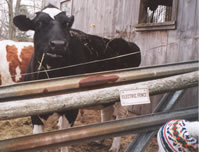Widening the Circle of Compassion:
Including Emily in Our Theological Vision
Mary
Margaret Earl
Trevor S. Maloney
Susan Roman
Introduction
By deciding to tell the story of Emily the Cow, and to understand her story theologically, we undertook a curious task. Many theological analyses with moral undertones begin with implicit shared assumptions, needing no explanation or exploration. For example, if we were to analyze a news story in which children were tied to looms and forced to work 16-hour days, we would all begin with a shared assumption that such treatment was wrong and seek to find theological meaning in the matter. Likewise, if we were to launch an analysis of the United States political scene before women were granted the right to vote, we would begin with the assumption that women ought to have the same rights to citizenship as men.
Here, in this project, there is no such assumption.
The three authors of this project do share a common
conviction that animals matter, are significant in Godís creation, and
ought not be treated and killed as they are. This conviction is a minority
opinion. Therefore, we sought here to first to make explicit our
conviction, argue, and defend it, illumine why it is difficult to hold
this opinion in the face of mainstream theology, and then conduct an
analysis. This meant undertaking an ambitious project. However, it is one
that we hope will be helpful to the theologically minded, the friends of
animals, and, mostly, somehow, to the animals themselves.
Respectfully and in peace,
Mary Margaret Earl
Trevor Maloney
Susan Roman
